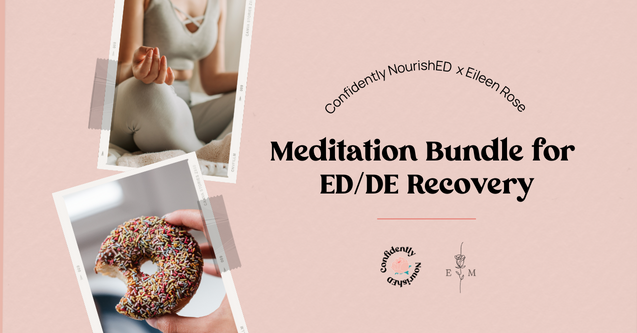
Eating disorders and disordered eating are complex mental health conditions that can be incredibly challenging to overcome. They often involve a disconnection between the mind and the body, leading to a range of physical and emotional symptoms. Many people with eating disorders struggle with anxiety, depression, and low self-esteem, making it difficult to establish a healthy relationship with food and their bodies.
This is where meditation can be incredibly helpful! Meditation is an ancient practice that involves focusing your attention on a particular object, sound, or sensation to achieve a state of mental clarity and relaxation. It has been used for centuries to improve physical and emotional well-being, and there is now a growing body of research showing that it can be especially helpful for those struggling with eating disorders.
Through regular meditation practice, you can learn to develop a more compassionate and accepting relationship with yourself and your body, which is key to healing from an eating disorder or disordered eating.
Here are some of the ways that meditation can support eating disorders and disordered eating recovery:
Table of Contents
Cultivating Awareness
Meditation can help you become more aware of your thoughts, feelings, and bodily sensations. This increased awareness can be helpful for recognizing patterns and triggers related to your eating disorder or disordered eating. By noticing these patterns, you can work on developing strategies to cope with them in a healthier way.
Reducing anxiety and depression
Many people with eating disorders struggle with anxiety and depression. Meditation has been shown to be an effective tool for reducing symptoms of anxiety and depression, which can help make it easier to engage in recovery activities. Science is still trying to figure out exactly how meditation works in the brain, but one study found that people who meditated for eight weeks had more activity in a part of their brain that’s usually more active in positive and hopeful people.1 So, not only can meditation help you feel calmer and more relaxed, it might just help you see things in a brighter light!
Developing self-compassion
Eating disorders and disordered eating are often driven by a negative self-image and self-criticism. Meditation can help you develop self-compassion, which involves treating yourself with kindness and understanding, rather than judgment and criticism. This can be incredibly helpful for building a positive relationship with yourself and your body. A 8-week study found that self-compassion meditation led to significant improvements in symptoms of disordered eating and increased self-compassion levels.2 Participants reported feeling more connected to others and more self-kindness.2 The study suggests that self-compassion interventions may be helpful for individuals with disordered eating and may lead to better outcomes in eating disorder treatment.2
Improving body awareness
Many people with eating disorders struggle with a disconnect between their mind and body. Meditation can help you develop a greater awareness of your body, which can be helpful for recognizing hunger and fullness cues, and developing a more intuitive relationship with food. A study published in the International Journal of Eating Disorders found that a body scan meditation practice was effective in improving interoceptive awareness, or the ability to perceive bodily sensations.3
Enhancing mindfulness
Mindfulness is a state of non-judgmental awareness of the present moment. Through regular meditation practice, you can develop a greater sense of mindfulness, which can be helpful for reducing impulsive behaviors related to food and developing a more thoughtful, intentional relationship with eating.

To get started with incorporating meditation into your recovery routine, download our FREE meditation bundle here!
No matter where you are in your healing journey with food and body image, these meditations will guide you toward a more peaceful state of mind. Each meditation addresses common concerns that eating disorders and disordered eating bring up such as unconditional permission to eat, body image, food guilt, self-comparison, and recovery. Whether you choose to go through these mediations in order or as needed, we encourage you to find some time to listen to at least one of them a day!
Note: While meditation can be a powerful tool for eating disorder and disordered eating recovery, it’s important to remember that it’s not a substitute for professional treatment. If you’re struggling with an eating disorder or disordered eating, it’s important to seek support from a qualified health professional!
References
- Kuchinskas, S. Meditation health benefits and stress reduction. WebMD. Retrieved April 28, 2023.
- Health Benefits of (Mindful) Self-Compassion Meditation and the Potential Complementarity to Mindfulness-Based Interventions: A Review of Randomized-Controlled Trials. Researchgate.net. Retrieved April 28, 2023.
- Merwin, R. M. (2010, August). Interoceptive awareness in eating disorders: Distinguishing lack of clarity from non-acceptance of internal experience. Researchgate.net.






0 Comments